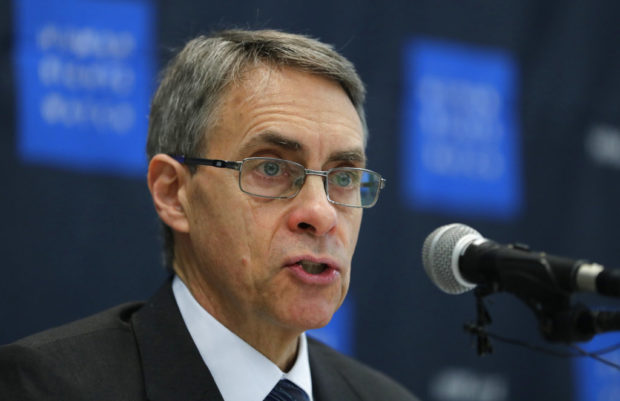
Kenneth Roth, Human Rights Watch’s executive director, speaks during a news conference in Seoul, South Korea on Nov. 1, 2018. AP
SEOUL, South Korea — North Korean refugees say sexual violence against women in their former homeland is part of daily life. But a new report suggests there’s little chance that abused women in the North will get to say “MeToo” anytime soon.
North Korea’s extremely patriarchal society means many women feel powerless to demand accountability over sexual violence, many are also ashamed of being abused, and some choose to keep silent because of flimsy law enforcement and support systems, according to a report published Thursday by New York-based Human Rights Watch based on interviews with 106 North Koreans who left the country, more than half of them after 2011.
Three women who left North Korea and three South Korean experts, separately interviewed by The Associated Press, agreed that sexual violence is a serious problem in the North, though the voices and economic power of women have gradually increased in recent years because of their role in burgeoning capitalist-style markets. Some said that North Korean women didn’t even understand that widespread assaults and harassment were abuse.
“Sexual violence in North Korea is an open, unaddressed and widely tolerated secret,” Kenneth Roth, Human Rights Watch’s executive director, said in a statement. “North Korean woman would probably say ‘MeToo’ if they thought there was any way to obtain justice, but their voices are silenced in Kim Jong Un’s dictatorship.”
The report comes as U.S.-led global diplomacy focuses on North Korean nuclear disarmament. The country’s abysmal human rights status, however, has been largely ignored. It’s not the first outside documentation of sexual violence in North Korea, but the report will likely anger North Korea, which often complains about what it claims is persistent U.S. hostility.
Kim’s propaganda service has called North Korea a “socialist paradise” and bristles at outside criticism of its rights conditions as a U.S.-led attempt to force regime change. A 2016 dispatch said every woman in the North is “highly valued and respected” and that they “all can lead a worthwhile life as a heroine of the times.” But this is also the country that called former female South Korean President Park Geun-hye a “prostitute.”
According to the report, titled “You Cry at Night but Don’t Know Why,” and the six people reached by the AP, sexual violence targeting women is rampant in North Korea. They say it happens in detention facilities, open markets, checkpoints, trains, streets and army bases.
The report details sexual abuse by men in official positions of power, such as prison guards, police officers, prosecutors, soldiers and market supervisors.
“Interviewees told us that when a guard or police officer ‘picks’ a woman, she has no choice but to comply with any demands he makes, whether for sex, money, or other favors,” the report said. “Women in custody have little choice should they attempt to refuse or complain afterward, and risk sexual violence, longer periods in detention, beatings, forced labor, or increased scrutiny while conducting market activities.”
One woman interviewed in the report said a police agent penetrated her several times with his fingers while questioning her illegal stay in China. Another talked about women in a detention center being forced to leave with a guard who raped them every night. They said that “click, click, click was the most horrible sound” because it meant the key was turning in the door of their prison cells. Several traders also described male officials at checkpoints conducting intrusive body searches of young women, spending more time checking around their breasts and hips and sometimes underneath their underwear.
Others in the report said police don’t consider sexual violence a “serious crime” and that it’s “almost inconceivable” to even consider going to the police to report their suffering because of possible repercussions. A pervasive social stigma keeps victims silent, the report said, adding that all of the interviewees described “widespread impunity for perpetrators of sexual violence and lack of justice for survivors.” They also spoke of deeply embedded patterns of discrimination against women, corruption and a lack of support mechanisms.
Women who talked to the AP said they didn’t even know what exactly sexual abuse was when they were in North Korea.
“Higher-level male (army officers) often patted female soldiers on their hips and breasts or put their hands underneath their uniforms around their necks when they passed by them. We saw these things lots of times, but we just thought they were specially favored by our bosses,” said Lee So Yeon, a woman who served in the North’s army before her 2008 escape.
A second woman said a detention center guard tried to rape her but moved away after she said her body was crawling with lice. A third woman said sexual abuse was considered shameful for women because people thought they must have brought it on themselves.
The Human Rights Watch report comes as North Korea struggles to win political and economic concessions from the United States in nuclear negotiations. It’s unlikely that the North will take any major steps toward improving its rights conditions because U.S. and South Korean officials don’t plan to openly raise the issue during the nuclear talks anytime soon.
“When we think about the North’s horrible rights conditions, I know we should tackle that issue right away but it’s also something that we can’t resolve overnight,” said analyst Cho Han Bum at Seoul’s Korea Institute for National Unification. If current diplomacy continues, “the North’s rights status at least won’t worsen as long as the country continues to open,” Cho said. /ee